
Research and development expenditures, or funds spent to conduct research, are the most frequently cited and consistent data for comparing research levels among colleges and universities. This data is reported annually through the NSF Higher Education Research and Development survey and is an important measure of growth.
Key Initiatives
STEAMPower Project: An Arts and STEM Collaborative
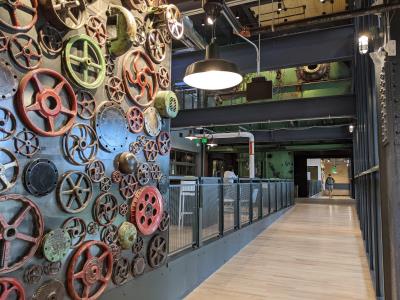 To initiate the research pillar of MSU’s Arts Strategy, fall 2022 will see the launch of a new program in which visiting artists-in-residence, leading MSU researchers and artists, and graduate students across disciplines collaborate to address important global challenges, sparking new research and modes of cross-disciplinary learning. Collaborators and design teams will come together on the fourth floor of the STEM Teaching and Learning Building, connecting with the building’s goal to spur curricular innovation and high-quality teaching, learning and research. Outcomes of this ongoing project will be to:
To initiate the research pillar of MSU’s Arts Strategy, fall 2022 will see the launch of a new program in which visiting artists-in-residence, leading MSU researchers and artists, and graduate students across disciplines collaborate to address important global challenges, sparking new research and modes of cross-disciplinary learning. Collaborators and design teams will come together on the fourth floor of the STEM Teaching and Learning Building, connecting with the building’s goal to spur curricular innovation and high-quality teaching, learning and research. Outcomes of this ongoing project will be to:
- Challenge faculty and artists to create novel broader impacts for research and experiential learning
- Prepare undergraduates to address future problems through cross-disciplinary courses/curriculum and project-based interdisciplinary learning
- Support graduate student success through integration into cross-disciplinary learning teams and methods of research and teaching, preparing them to be the next generation of transformative teachers and researchers
- Provide public programming that engages local communities in exploring questions from multiple disciplinary perspectives and connects them to the inquiry of artists, researchers, faculty and students
Solving Big Problems Together Through Transdisciplinary Research
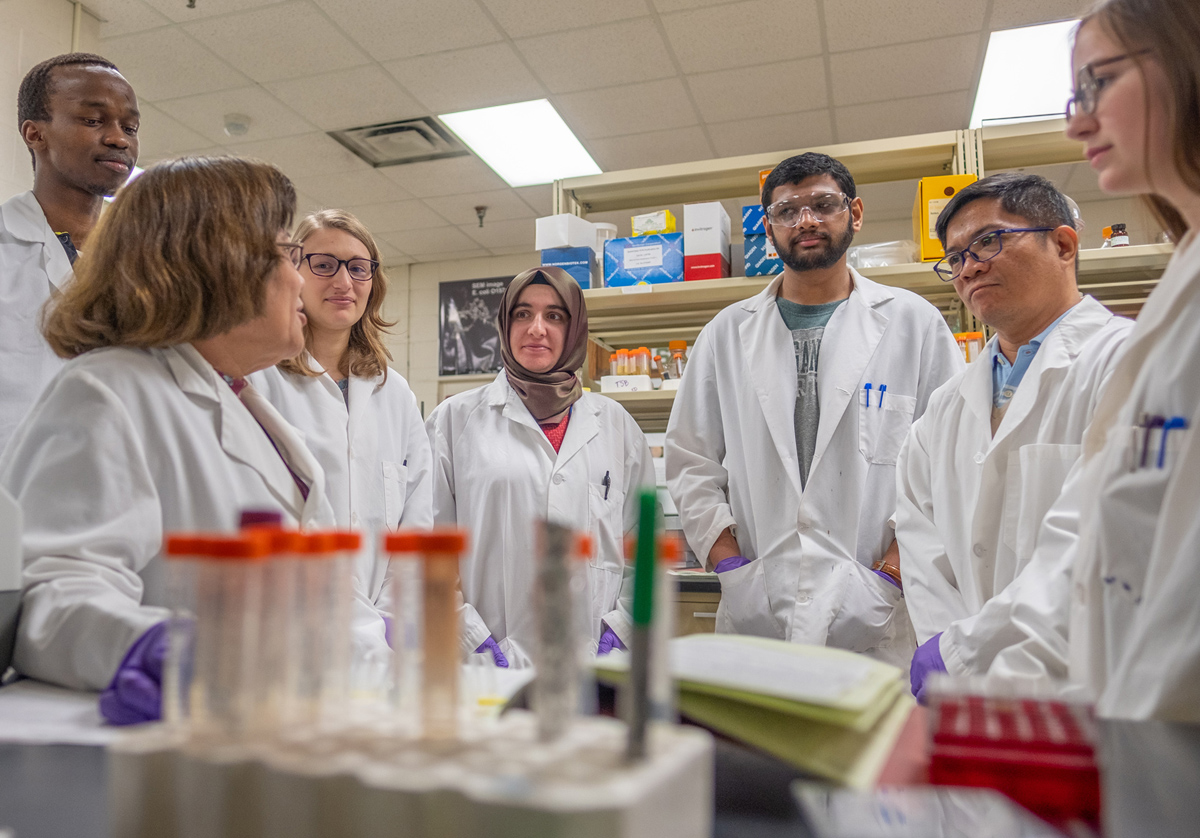 The depth and breadth of research at Michigan State, along with low barriers to collaboration, positions the institution to provide unique transdisciplinary solutions to society’s most urgent challenges. Through a series of campus convenings, we are bringing thought leaders together to develop ideas for new, crosscutting research projects. Once identified, these projects will receive a full suite of support from the Office of Research and Innovation, to include seed funding, grant proposal assistance and more to bring projects to fruition. In April 2022, the first such convening around climate change was held with 160 faculty, staff and students representing every college on campus and engaging many deans, the president and the provost. Smaller networking events are planned to further develop ideas and support research teams working toward proposals. The university strategic plan research implementation work group will help prioritize themes for future convenings.
The depth and breadth of research at Michigan State, along with low barriers to collaboration, positions the institution to provide unique transdisciplinary solutions to society’s most urgent challenges. Through a series of campus convenings, we are bringing thought leaders together to develop ideas for new, crosscutting research projects. Once identified, these projects will receive a full suite of support from the Office of Research and Innovation, to include seed funding, grant proposal assistance and more to bring projects to fruition. In April 2022, the first such convening around climate change was held with 160 faculty, staff and students representing every college on campus and engaging many deans, the president and the provost. Smaller networking events are planned to further develop ideas and support research teams working toward proposals. The university strategic plan research implementation work group will help prioritize themes for future convenings.
Corporate Partnerships Support Michigan’s Economy
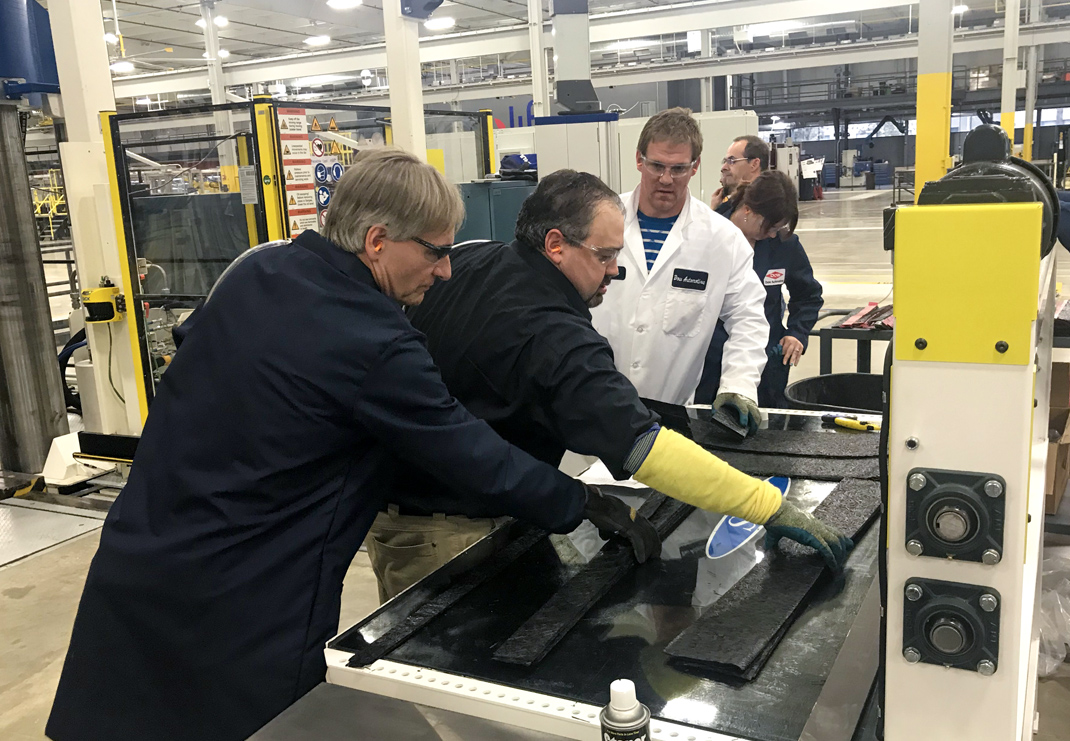 Academia and industry working together is a powerful model for bringing new technologies to market and driving local, regional and global economies. A premier example is the additive manufacturing and 3-D printing research being conducted at the Scale-up Research Facility (SuRF) in Detroit. SuRF was established with funding from the Michigan Economic Development Corporation and Department of Energy through the Institute for Advanced Composite Manufacturing Innovation. Last fall, BASF joined the facility and established its Applications Technology Center within the SuRF space. MSU’s collaboration with BASF will result in significant advances in additive manufacturing, new workforce development opportunities and sustainable economic growth. MSU will increase connection to industry and accelerate opportunities for corporate research and development by growing capacity in Business Connect and alignment with University Advancement.
Academia and industry working together is a powerful model for bringing new technologies to market and driving local, regional and global economies. A premier example is the additive manufacturing and 3-D printing research being conducted at the Scale-up Research Facility (SuRF) in Detroit. SuRF was established with funding from the Michigan Economic Development Corporation and Department of Energy through the Institute for Advanced Composite Manufacturing Innovation. Last fall, BASF joined the facility and established its Applications Technology Center within the SuRF space. MSU’s collaboration with BASF will result in significant advances in additive manufacturing, new workforce development opportunities and sustainable economic growth. MSU will increase connection to industry and accelerate opportunities for corporate research and development by growing capacity in Business Connect and alignment with University Advancement.
Developing Talent for a Diverse America
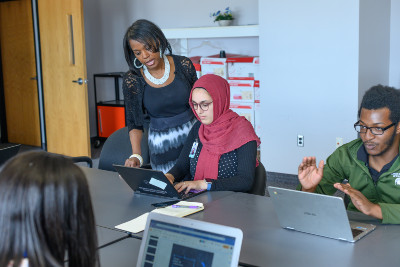 Difficult problems require critical and diverse thinking, and we are broadening participation by seeking out and inviting scholars from different backgrounds to join our community. Leveraging the themes of outreach and partnership, our faculty are working with colleagues at other institutions, not only on collaborative research, but to form academic agreements and pathways to graduate programs. In the past year, MSU and Spelman College, a historically Black college for women in Atlanta, created a new program for data science, one of the fastest growing fields in the country. Through support from NSF and a Sloan Foundation grant, MSU faculty will bring Spelman’s faculty to campus to work together on data science, helping them to integrate it into their scholarship and teaching, and bringing new, diverse voices to the data science community. This project, led by Andrew Christlieb, MSU Foundation Professor of Mathematics and Professor of Computational Mathematics, Science and Engineering, will be used as a model program for new partnerships. Other research opportunities for underrepresented students include the summer Research Experience for Undergraduates (REU) program at the Kellogg Biological Center and the PREP and ENDURE postbaccalaureate programs that continue to increase diversity and graduate student enrollment.
Difficult problems require critical and diverse thinking, and we are broadening participation by seeking out and inviting scholars from different backgrounds to join our community. Leveraging the themes of outreach and partnership, our faculty are working with colleagues at other institutions, not only on collaborative research, but to form academic agreements and pathways to graduate programs. In the past year, MSU and Spelman College, a historically Black college for women in Atlanta, created a new program for data science, one of the fastest growing fields in the country. Through support from NSF and a Sloan Foundation grant, MSU faculty will bring Spelman’s faculty to campus to work together on data science, helping them to integrate it into their scholarship and teaching, and bringing new, diverse voices to the data science community. This project, led by Andrew Christlieb, MSU Foundation Professor of Mathematics and Professor of Computational Mathematics, Science and Engineering, will be used as a model program for new partnerships. Other research opportunities for underrepresented students include the summer Research Experience for Undergraduates (REU) program at the Kellogg Biological Center and the PREP and ENDURE postbaccalaureate programs that continue to increase diversity and graduate student enrollment.
Investing in Future Research Excellence
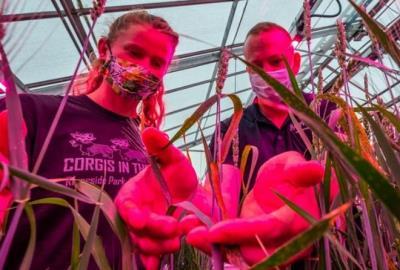 From our early days developing hybrid corn to cutting-edge research in drought- and pest-resistant plants, MSU has been a global leader in plant and agricultural sciences. Maintaining our leadership position in plant science requires us to look over the horizon for the next great opportunity. The Plant Science Excellence Committee, a cross-campus planning group initiated in 1998 and now in its fourth iteration, was engaged over the past year to develop a list of priorities to extend our capabilities and reputation. Research conducted in the MSU greenhouse facilities supports every commodity group in Michigan agriculture, and the committee’s report confirmed the need for updated greenhouse and growth chamber facilities to expand our impact. Collaborating with both the Infrastructure Planning and Facilities team and the Real Estate and Capital Planning team, faculty groups are contributing to the campus comprehensive planning effort by systematically addressing the most important research infrastructure needs across campus.
From our early days developing hybrid corn to cutting-edge research in drought- and pest-resistant plants, MSU has been a global leader in plant and agricultural sciences. Maintaining our leadership position in plant science requires us to look over the horizon for the next great opportunity. The Plant Science Excellence Committee, a cross-campus planning group initiated in 1998 and now in its fourth iteration, was engaged over the past year to develop a list of priorities to extend our capabilities and reputation. Research conducted in the MSU greenhouse facilities supports every commodity group in Michigan agriculture, and the committee’s report confirmed the need for updated greenhouse and growth chamber facilities to expand our impact. Collaborating with both the Infrastructure Planning and Facilities team and the Real Estate and Capital Planning team, faculty groups are contributing to the campus comprehensive planning effort by systematically addressing the most important research infrastructure needs across campus.
Ethics at the Core
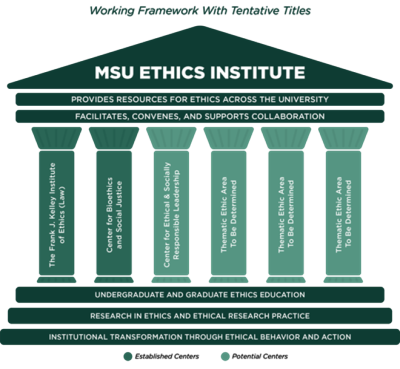 Through generous donor support and with leadership across campus, the university is working to establish an MSU Ethics Institute and become a global leader in ethical theory and practice. The purpose of the institute is to strengthen teaching, research, experiential learning and co-curricular activities for students, staff and faculty around the theory and practice of ethics; to prepare MSU students for ethical decision making and as leaders ready to face emerging ethical challenges of their times; to foster sound norms of ethical reasoning and civic discussion within and beyond the university; to enhance ethical theory through applied practice and to enrich practice in dialogue with leading-edge ethical theory; and to support communities (local, regional and global) in addressing pressing and important local and global ethical issues. Goals include being a catalyst for research in ethical theory and applied practice; providing transformative learning experiences for students to discover values that will shape their lives; nurturing an understanding of ethical challenges across the globe through the study, teaching and practice of ethics; and advancing community-engaged activities that bring ethics intentionally into public life. A coordinator for the initiative has been hired to lead and communicate the MSU Ethics Institute’s vision, and a website provides information about the initiative.
Through generous donor support and with leadership across campus, the university is working to establish an MSU Ethics Institute and become a global leader in ethical theory and practice. The purpose of the institute is to strengthen teaching, research, experiential learning and co-curricular activities for students, staff and faculty around the theory and practice of ethics; to prepare MSU students for ethical decision making and as leaders ready to face emerging ethical challenges of their times; to foster sound norms of ethical reasoning and civic discussion within and beyond the university; to enhance ethical theory through applied practice and to enrich practice in dialogue with leading-edge ethical theory; and to support communities (local, regional and global) in addressing pressing and important local and global ethical issues. Goals include being a catalyst for research in ethical theory and applied practice; providing transformative learning experiences for students to discover values that will shape their lives; nurturing an understanding of ethical challenges across the globe through the study, teaching and practice of ethics; and advancing community-engaged activities that bring ethics intentionally into public life. A coordinator for the initiative has been hired to lead and communicate the MSU Ethics Institute’s vision, and a website provides information about the initiative.